25 year old Captain Huxley had arrived in Calcutta from southern Africa only three days ago. The amount of construction going on here was clear evidence of the superiority of the British. Calcutta was fast becoming the jewel of the King's crown in India. The past three days had been spent purchasing personal supplies, meeting fellow officers, and exploring the city.
In Africa he had been protecting the settlement of British colonists in the area around Bathurst, here he had orders to report to take over command of a fort in the territory of the former Maratha Empire. On April 6th, 1821 he set out for the 18 day journey with five British soldiers and two baggage carriers.
Other officers had warned of the possibility of bandits, but he didn’t think any would try against armed soldiers of His Majesty. Telling his men to keep alert anyway as they left the protection of the area around the city and started on the long journey. Huxley was the only one on a mount, so he kept at a walking pace.

Thuggee Cult
The earliest mention I found is that the King of Delhi, old Jalal-ud-din Khilji, banished a group of 1000 ‘thieves and thugs’ by sending them down the river on boats into neighboring Bengal in the 1290’s. Just a few years later in the early 1300’s they actually helped Bengal repel an invasion from Delhi led by his successor, so the plan of sending his criminals next door didn’t quite work out how he wanted. From that point on, the Thuggee cult seeped into every corner of India to prey on travelers.
Many of us saw this group portrayed in Indiana Jones and the Temple of Doom

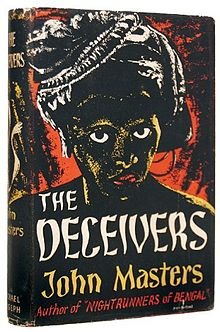
The writers of the script used them as a base to expand upon when making the plot. The word Thuggee derived from the Hindi word thag - deceiver and the Sanskrit sthaga - cunning. Coming to be used in our own English word of ‘Thug’, both as being brought into use by British soldiers and also stemming from the 1839 book Confessions of a Thug.
A Thuggee inveigler was like a scout and chose which groups would be targeted. They waited in areas where travelers and merchants were known to be and operated by posing as merchants, travelers, pilgrims, or soldiers and, solo or in small groups, join a caravan or other band of travelers. With all the stories of merchants and travelers being attacked on the road, many groups were glad to have an extra body or two along. One elaborate Thugee group was even said to pretend to be a Rajah travelling with his entourage. The Thugs would befriend them and earn their trust as time and days passed. If they caravan was large, numerous small groups of Thugs would join every few days or weeks, incrementally so to not cause any alarm.
The added benefit of this tactic was even if the actual merchants became alarmed at the new members they would often say something to the Thuggees who first joined! Then those Thuggees could reassure or in some way allay the fears of the caravaners. Also since the merchants had travelled so far from home, few of their colleagues would come searching for them. Thuggees were known to avoid apparently wealthy caravans on shorter journeys, so to avoid unwanted attention. This is how they were able to stay active as a group for centuries without being hunted down by various rulers.
Huxley and his men had spent the sixth night as guests of a local village. That morning, as they prepared to leave, a man approached. He said his name was Mukta and asked if he could walk with us as he was also heading along that road and would like to walk together for safety. Seeing no harm in one man accompanying them for a bit of time, especially a local man that spoke English.
Mukta told Huxley about his family and why he was away from his home, he had heard that his brother was sick and so had gone to visit him and his family. When he got there he found his brother alive and no longer sick, and after spending some time there had gone on to the nearby city to make arrangements for the sale of this years’ rice crop. Mukta said that he, some cousins, and a few men run a rice plantation.
Thug Life
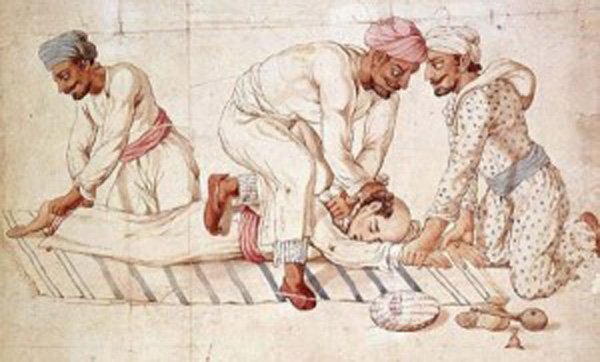
Many Thuggees were outstanding members of their communities. British agents investigating the Thugs found out, much like today, that several prominent bankers were found to be members. Not only that, they were in other important positions throughout India. If the local politicians weren’t an actual member of the Cult, many times they were already bought by Thuggee bribes. The common people were scared to do anything about the Thugs because their local constable could be bought or a member, and they might then find themselves the next sacrifice to Kali.
“The most astounding fact about the Thug is that . . . he was a good citizen and model husband devoted to his family and scrupulously straight when not on his expeditions, presenting a complexity of character utterly baffling to a student of psychology. It was essential to the safety of their criminal operations that they should pass as peaceful citizens. . . . Not only had they left no trace behind of their foul deed, but they concealed their trail by every art and craft, and with ill-gotten rupees bribed officials, police and villagers, in whose territory the murders had occurred. . . . It is not extraordinary that Thuggee remained a mystery; rather it is remarkable that it was ever brought to light”– William Sleeman
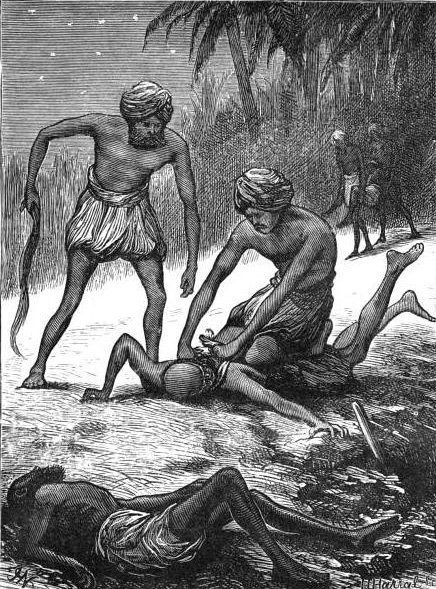
They had also developed their own language, Ramasi, which allowed them to speak to other Thuggees without fear of being caught. When they felt the time was right, often at night and in special areas they called beles - groves, the Thuggees would position themselves near their victims and a secret word or phrase was spoken, oft said to be “Bring the tobacco”. Two or three thugs would quickly and silently strangle each victims using their own headgear (sometimes worn as a waistcloth too) – a yellow rumal. They would take everything of worth, and give the bodies to Kali. Frequently the beles would have pre-dug graves nearby. If not, they would use their special short pickaxe every Thuggee carried to dig one. They would place the body into the grave and disembowel it as the sacrifice for Kali and a portion of the loot was given to the group for general use and bribery.
Strangulation, or garroting, was the preferred method used by the Thuggee since every victim was given to Kali, who would feast upon their blood, so none was to be spilled. Occasionally they would break necks or use poison. Thugs would not attack women or children, and especially no pilgrims as one of their legends states
”The thieves wanted to make a human sacrifice to Kali, and unwisely chose a saintly Brahmin monk as their victim. The radiance of the young monk was so much that it burned the image of Kali, who took living form and killed the entire band of thieves, decapitating them and drinking their blood.”
Huxley found Mukta to be an agreeable traveling companion. He was able to ask him about many issues and customs of the Indian people. Things he felt might be useful during his time in command of the fort. Mukta told Huxley about his five children, 3 sons and 2 daughters, and his wife Kamala. He shared about how his family has managed to make a life from the rice crops, and was hoping to expand in the next few years. Huxley shared about his experiences in Africa and his family, and his beloved Tabitha whom he would marry upon his return to England.
Huxley liked talking with Mukta, who had a decent education, about a variety of subjects as it made the time pass quicker. He was beginning to enjoy Mukta’s company and conversation, finding certain aspects of the Indian culture fascinating. Maybe this journey wouldn’t be such a waste after all.
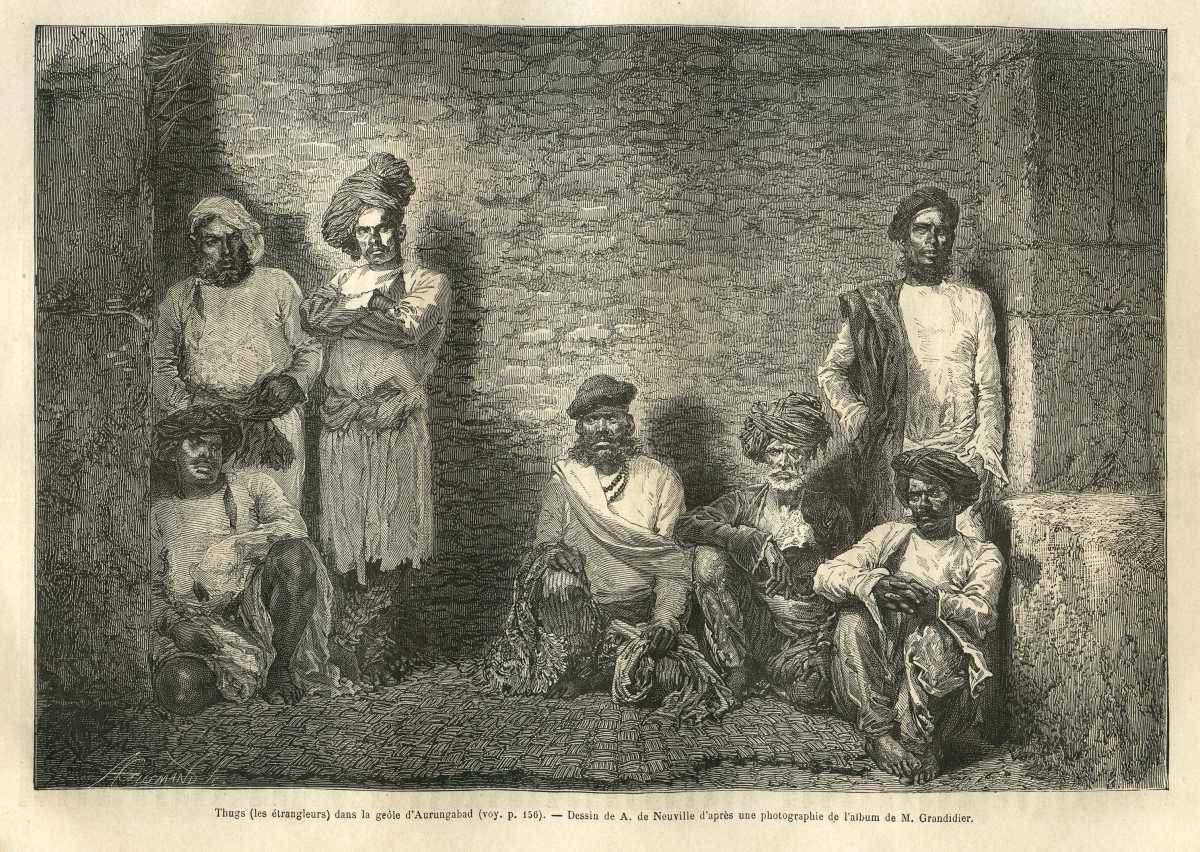
To become a Thuggee was mainly based on hereditary membership – from father to sons. But sometimes outsiders or orphans (occasionally the sons of their victims) would be recruited. To my knowledge their initiation is the only one, out of many secret societies, where a human life had to be taken. When a Thugs son was about 10 years of age he was taken on his first outing and made to witness their first murder, to get him accustomed to it as well as lessen any suspicion. When he was around 18 years old he would perform his first garrote and achieve the rank of bhuttote - strangler.
After the British came into power over most of India by defeating the Maratha Empire in 1818 they set about colonizing it. At first the disappearances and deaths were chocked up to regular murderers and bandits, but after about a decade it seemed to be something more. That is when it was found that an organized group was responsible for all the deaths, the Thugs.
The Extermination
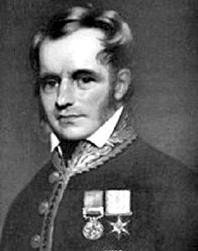
Sir William Sleeman was appointed head of the division to rid the country of the Thuggee cult. He spent over a decade fighting and arresting every Thug he came across. Using investigative tactics like lighter punishments or banishment for those Thugs that gave up the location and names of their companions. From 1829-1837 Sleeman and his division had arrested and tried 3,266 (with another 500 awaiting trial)– sentencing many to a life of hard labor and executing the worst of them. The highest murder count was by a man named Behram, he confessed to have either personally killed or been present for 931 murders.
Magistrates across India sent letters from 1840-1841 stating that no bodies of strangled travelers could be found in their districts. It appeared that the efforts of Sir Sleeman had worked, and travelers were safe from the Thugs. Many years later accounts from some Thugs that escaped said that they thought Kali had abandoned them and they had given up the cult.
Estimates of the death toll over their more than 500 year history reach as high as two million, the true number will never be known. Some people cannot believe that an order that had lasted so long and had been a dark underground in nearly every piece of India could have fallen so fast. That some true believers must have kept faith in Kali, and have passed the order down through their sons until present day.
I would say that anyone that reads this and travels to remote areas in India be wary of friendly men wearing yellow rumals.
One afternoon, after four days of travelling together, Mukta proclaimed that we were near where his cousins should be at this time of the season. A few hours later and the party comes across a grove with a few tents set up and a goat roasting over the fire. Around the fire a few men sat laughing in conversation.
Mukta said “Here is my destination, please come. Enjoy a meal and spend the night. Let me repay you for your company and protection over these past few days.” It was nearly time to lay up for the night anyways, and the goat looked much more tempting than the oatmeal they had been eating the past few days so Huxley and his men followed Mukta into the encampment.
Introductions were made all around, many of the men were Mukta’s cousins, some were business partners – but they were all friendly. There were even two boys, one of which was Mukta’s son, lads of about 10 years of age. Huxley and his soldiers were given the best parts of the goat, and the meat was a change that his palate welcomed.
He looked up at the stars in the night sky, they were beautiful and Huxley thought that maybe his time in India wouldn’t be so bad. At least he would have some stories to tell the children he would have with Tabitha.
Mukta turned from talking with a cousin and asked if Huxley would like to smoke a pipe before turning in for the night. Huxley smiled and nodded gratefully. Mukta grinned while he stood up and turned to another man behind them and said
